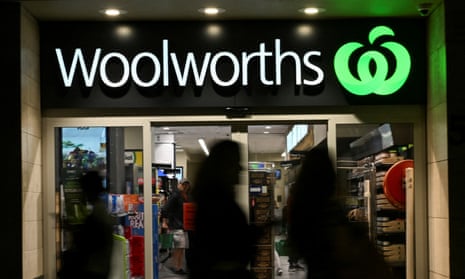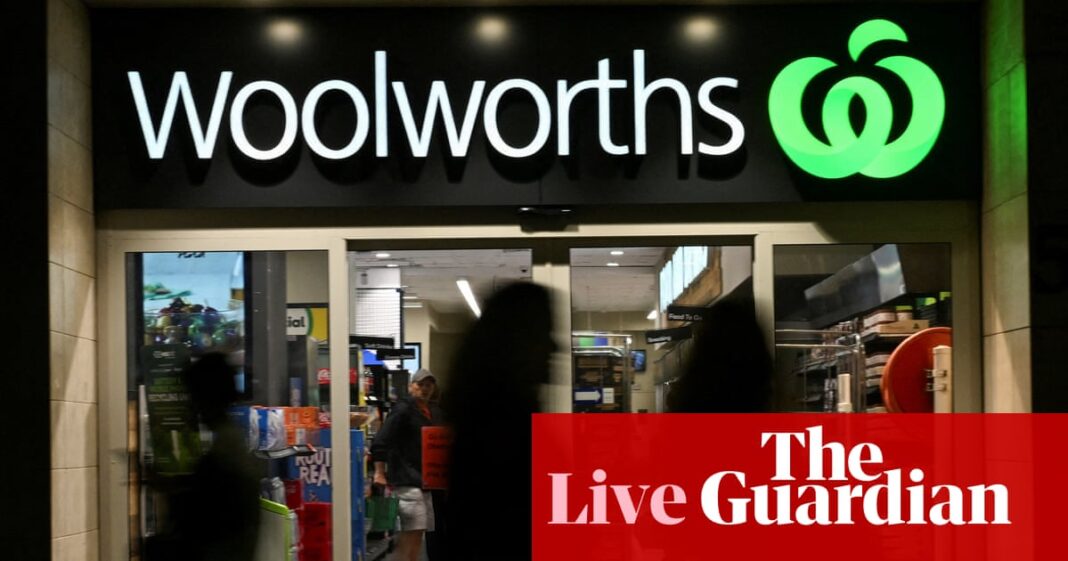Woolworths suffers rare profit slide as customers search for deals
Jonathan Barrett
Australia’s biggest supermarket chain, Woolworths, has recorded a slide in profits after it was forced to entice cash-strapped customers with larger discounts and it suffered a financial hit from industrial action at its distribution centres.
Woolworths, which owns supermarkets in Australia and New Zealand and operates the Big W department store chain, reported a 21% drop in its six-month net profit result to $739m, and its profit margins have been squeezed.
The result marks a rare pullback in profitability for a company that has printed large returns throughout the pandemic and inflationary period.
It estimates the impact to sales from the industrial action at its warehouses, undertaken by workers during pay negotiations, was about $240m.
Sales still ticked higher at its main money spinner, its Australian supermarket chain, during the half-year period, but customers have been watching their budgets closely amid cost-of-living pressures.

In its half-year financials released today, the company said:
Outside of the disruption, customer transactions continued to grow during the half but items per basket declined as rates of cross-shopping increased during the year reflecting cost-of-living pressures and more choices for customers.
While we continue to optimise our promotional activity, cost-of-living pressures for customers persist with value-seeking behaviours and cross-shopping expected to continue.
Key events

Caitlin Cassidy
Henderson says Coalition would adopt ‘zero tolerance’ policy of antisemitism on university campuses
A Coalition government would adopt a “zero tolerance” policy of antisemitism on university campuses, Sarah Henderson also told the conference.
Academic freedom must not be used to falsely cloak incidents of antisemitism … we will not wait for universities to act in their own time.
Henderson said the Coalition would require all universities to adopt the controversial International Holocaust Remembrance Alliance (IHRA) definition of antisemitism, as Labor recommended, and implement a national higher education code. It would also establish a judicial inquiry into antisemitism, and amend the Fair Work Act if required to cover university employees.
I am inspired by the words of Ben Sasse, the president of the University of Florida, who said: ‘We will always defend your rights to free speech and free assembly, but if you cross the line on clearly prohibited activities, you will be thrown off campus and suspended. That means a three year prohibition from campus … The students weighed the costs, made their decisions and will own the consequences as adults.We’re a university, not a daycare. We don’t coddle emotions. We wrestle with ideas.

Caitlin Cassidy
Shadow education minister flags Labor reforms Coalition would undo if elected
Sarah Henderson has flagged a number of Labor reforms the Coalition would undo if elected this year, including reinstating the 50% pass rule that removes commonwealth supported funding if students fail more than half of their courses and reversing changes to the Australian Research Council (ARC) grant process.
She said the Coalition’s position on the controversial jobs-ready graduates scheme hadn’t changed, but it would undertake a review into the policy’s outcomes. On ARC, she said the government had “absolved itself” of the “responsibility to safeguard precious taxpayer funds”.
We will seek to reverse this decision, because under our Westminster system of government, the buck stops with the government of the day and not an unelected board.
Henderson said the Coalition would also impose a harsher international student cap than the legislation proposed by Labor, which it rejected, with “more to say in the coming weeks”.
For too long, universities have relied on a business model which yielded them eye-watering revenues, but which are not sustainable or in line with expectations of the Australian community. We will deliver a tougher student cap than what is proposed by the government focused on excessive numbers of foreign students in metropolitan cities, particularly Melbourne and Sydney, where two thirds of foreign students live and study.
She said the government was also concerned about “a range of governance issues”, including the high remuneration of vice chancellors which “does not meet the pub test”.

Caitlin Cassidy
Shadow education minister says university sector has ‘suffered loss of community trust’
Universities have left students “high and dry too many times” and are suffering a “loss of community trust”, the shadow minister for education, Sarah Henderson says.
Addressing the Universities Australia annual summit in Canberra, Henderson outlined the Coalition’s priorities for universities ahead of the federal election, underpinned by the premise “Australian students must come first”.
Universities must be governed by strong and principled leaders who run their institutions efficiently, transparently and with integrity.
To put students first, universities must be able to operate with certainty and plan for the long term, free from day to day government intervention and policy chaos overseen by a tough and feared regulator … and universities must treat every taxpayer-funded research dollar as precious.
Henderson accused the Labor government of launching from “crisis to crisis” in the university sector, leaving higher education providers “in considerable turmoil”.
I think it’s fair to say the university sector has suffered a loss of community trust throughout the term of the Albanese government. The government’s weak leadership, chaotic policy agenda and lack of consultation on the issues which matter have not helped your cause.
Steele-John outlines further details on Greens proposal to add ADHD and autism assessments to Medicare
The Greens disability spokesperson, Senator Jordon Steele-John, was on ABC RN earlier this morning to discuss the party’s plan to add ADHD and autism assessments to Medicare.
He said this was aimed at people seeking diagnosis so they can access services or supports, “but they simply can’t get access to those supports because it costs too much to get the assessment in the first place”.
Self diagnosis is very valid, particularly in a situation where – because of these costs and wait times – it’s often totally beyond possible to get an access to a formal diagnosis. But what it can open up is access to services and supports which you can’t access if you don’t have that formalised diagnosis …
It can also play a role in self-understanding. There’s a kind of ‘aha moment’ where, finally, often, people share that they gain a new understanding of themselves and their experience of life. And I think what I am hearing really clearly from people … is a demand for action from government. We’ve seen in the last week that community and Greens pressure in relation to expanding Medicare can work.
Greens launch plan to add ADHD and autism assessments to Medicare
The Greens have today launched a plan to add ADHD and autism assessments to Medicare, aiming to save people seeking a diagnosis thousands of dollars.
In a statement, the Greens said the plan – costed by the Parliamentary Budget Office – would add the assessments to Medicare to be billed by a paediatrician, psychiatrist, psychologist, nurse practitioner or general practitioner.
People of all ages would be eligible, and the rebate would be set at the average cost of a diagnosis, allowing health practitioners to bulk bill. The Greens said the plan would cost $181m dollars over the forward estimates.
The Greens leader, Adam Bandt, said in a statement:
Labor has already adopted the Greens’ plan to expand Medicare to see the GP for free and getting these assessments covered too, as well as dental and mental health, are logical next steps.

Krishani Dhanji
Kennedy says ‘we do not cost opposition policies’
Sticking with Senate estimates and we’re onto questions, and to no surprise shadow finance minister Jane Hume is asking Stephen Kennedy why Treasury costed the lunch policy.
But before we can get into an answer, there’s a heated exchange between the minister Katy Gallagher, Hume and opposition senator James McGrath (following a major blowup between the three yesterday). Gallagher said:
[You were] talking over the top of witnesses yesterday Senator Hume, yeah, she should be listening to answers … You were a major offender yesterday, Senator McGrath, particularly if a woman was speaking.
Back to Kennedy, he said the department “did not cost opposition policy”.
I’ve been very clear in the documents that we did not consider that we were costing the opposition’s policy. The opposition had that policy, as I understand from the media, costed by the PBO… We costed a policy that the government gave us some parameters on.
But I said, I can be clear through all of this, we did not cost your policy we don’t cost opposition policies.
Australia shouldn’t consider reciprocal tariffs: Treasury boss

Krishani Dhanji
While the world responds to the Trump administration’s tariffs, Treasury boss Stephen Kennedy has told Senate estimates Australia shouldn’t put up it’s own tariffs.
He said Australia putting tariffs on other products would lower productivity and competition:
Ultimately, tariffs can push up a broader set of prices across the economy and reduce economic growth.
If Australia were to impose tariffs, we would bear nearly all the cost, given our size and inability to affect the world prices of the goods we import. Cutting tariffs has provided substantial benefits to the Australian economy.
Kennedy urged policy =makers not to “cut ourselves off” from the global economy.
Woolworths suffers rare profit slide as customers search for deals

Jonathan Barrett
Australia’s biggest supermarket chain, Woolworths, has recorded a slide in profits after it was forced to entice cash-strapped customers with larger discounts and it suffered a financial hit from industrial action at its distribution centres.
Woolworths, which owns supermarkets in Australia and New Zealand and operates the Big W department store chain, reported a 21% drop in its six-month net profit result to $739m, and its profit margins have been squeezed.
The result marks a rare pullback in profitability for a company that has printed large returns throughout the pandemic and inflationary period.
It estimates the impact to sales from the industrial action at its warehouses, undertaken by workers during pay negotiations, was about $240m.
Sales still ticked higher at its main money spinner, its Australian supermarket chain, during the half-year period, but customers have been watching their budgets closely amid cost-of-living pressures.
In its half-year financials released today, the company said:
Outside of the disruption, customer transactions continued to grow during the half but items per basket declined as rates of cross-shopping increased during the year reflecting cost-of-living pressures and more choices for customers.
While we continue to optimise our promotional activity, cost-of-living pressures for customers persist with value-seeking behaviours and cross-shopping expected to continue.

Krishani Dhanji
Treasury secretary fronting estimates this morning
Treasury secretary Stephen Kennedy is in front of estimates this morning, and is providing an update on the state of the global economy.
He said uncertainty around trade could risk business and employment in Australia:
The escalation in trade tensions is creating significant global policy uncertainty. This may dampen business investment, including in Australia, which will pose risk to both growth and employment.
Kennedy also said while there’s been economic growth in the US, growth in other advanced areas, particularly around Europe “remains weak”.
In Australia, Kennedy said inflation around rent and insurance premiums have been going down, as well as services inflation, which he says has “tended to be more persistent”.
Once questions start, we can expect the opposition to grill the Treasury boss on why his department did costings on the opposition’s tax-free lunch policy (yes, we’re likely to go back to that again).
Tropical Cyclone Alfred still well-off Queensland coast
Let’s check in with Tropical Cyclone Alfred, which has been tracking through the Coral Sea off the coast of Queensland this week.
The Bureau of Meteorology said it remains a category 2 system, and is currently located 950km north-east of Mackay, moving slowly.
It is expected to reach category 3 intensity today and remain well offshore from the Queensland coast for the rest of this week.
The bureau said there is still a risk of it moving closer to the Queensland coast on the weekend, “however there remains large uncertainty with the track and intensity forecast for Alfred in the longer term”.
